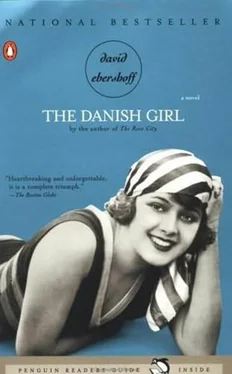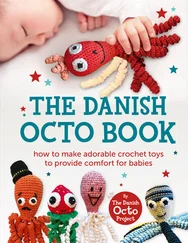Apart from that tragedy, his life had been good. “Because I left Denmark,” he said. “Life there is too neat and orderly for me. Too cozy.” Greta would sometimes say that as well, when she couldn’t paint and friends invited them to another smorgasbord. “Too cozy to work,” she ’d say, her silver bracelets shaking. “Too cozy to be free.”
“And now I’ve been on my own so long I’m not sure I could ever get married. Too stuck in my old ways, I am.”
“Don’t you think marriage is the one single thing we all should hope for most in life? Doesn’t it make you more whole than living all alone?”
“Not always.”
“I think it does. Marriage is like a third person,” Lili said. “It creates someone else, more than just the two of you.”
“Yes, but not always for the best,” Hans said. “Anyway, how would you know anything about all of this?”
Just then something told Lili to check her purse. Her hand felt the empty iron of the chair’s back. “It’s gone,” she said so softly that Hans’s forehead lifted and he murmured, “What?” Again, “My purse is gone.”
“The Gypsies,” Hans said, jumping to his feet. The café was in a small square with six alleyways running into it. Hans ran a few feet down one alley and realized the Gypsies weren’t there, and then ran into the next, his face reddening.
“Let’s go to the police,” he finally said, leaving francs on the table. He warned another woman whose pull-string satchel was hanging from her chair. He pulled Lili’s hand. He must have seen the white in her cheek, because he kissed it, gently.
The only thing in the purse was a little wad of money and a lipstick. The purse was Greta’s, a cream kid bag with loop handles. Other than the lipstick and a few dresses and two pairs of shoes and her camisoles and underwear, Lili owned nothing. She was free of possessions, and that was part of the appeal in those early days of Lili-that she came and went, and there was nothing more to concern her than the wind lifting her hem.
The police station was on a place with orange trees growing in a little center park. The evening sun reflected in the station’s front windows, and Lili could hear the clatter of the shop owners closing their shutters. Lili realized her sunglasses were also in the purse, a funny pair with flip-up lenses Greta’s father had sent from California. Greta would be angry that they were gone, that Lili had failed to pay attention to who or what was around her; and just then, just as Hans and Lili reached the steps of the police station, where a family of dingy white cats was rolling on its backs, just then Lili realized that she couldn’t report the stolen purse. She stopped on the steps.
Lili had no identification, she had no passport; why-and it had never occurred to her, nor had anyone ever bothered to ask-she didn’t even have a family name.
“Let’s not make a fuss about this,” she said. “It’s just a silly old purse.”
“Then you’ll never get it back.”
“But it isn’t worth the trouble,” she said. “And Greta is waiting. I just realized I’m late. I’m sure she ’s waiting for me. She wanted to paint this evening.”
“She’ll understand.”
“Something tells me she wants to see me right now,” Lili said. “I just have this funny feeling.”
“Come on now. Let’s go inside.” Hans took Lili’s wrist. A pull up the first step. He was still being playful, in a fatherly sort of way. He tugged again, and this time the pressure on her wrist hurt a little more, although it was no more painful than an aggressive handshake.
And just then-why, she would never know-something told both Lili and Hans to look down at the front of her dress. Growing on the white housedress patterned with conch shells was a round stain of blood, a stain so red it was nearly black. It was seeping outward like the ringed wave of a pebble landing in a pond.
“Lili? Are you hurt?”
“No, no,” she said. “I’m fine. I’ll be fine. But I should be getting home. Back to Greta.” Lili could feel herself shrinking inward, retreating back down the tunnel, back to Lili’s lair.
“Let me help you. How can I help you?”
As each second passed Hans felt farther away; his voice sounded as if it were traveling through a dull iron pipe. It was like at the Rådhuset ball: the blood was heavy, but she felt nothing. Where it was coming from she had no idea. She was both alarmed and amazed, like a child who has accidentally killed an animal. A little voice in her head shouted, “Hurry!”-a frantic little voice equally panicked and enjoying the small brief drama of an afternoon in Menton in August. Lili left Hans on the steps of the police station, turning three corners immediately, running away from him as the Gypsy children had run off from her, the stain on her dress spreading as persistently, as appallingly, as a disease.

Greta’s new style was to paint with pastel-bright colors, especially yellows and candy pinks and ice blues. She still painted only portraits. She still used the paints that arrived in glass bottles with unreliable stoppers from the firm in Munich. But where her previous paintings were serious and straightforward and official, her new paintings, in their levity and color, looked, as Lili once said, like taffy. The paintings were large and depicted their subject, by now almost always Lili, outdoors, in a field of poppies, in a lemon grove, or against the hills of Provence.
While she painted, Greta thought of nothing, or what felt to her like nothing: her brain, her thoughts, felt as light as the paints she mixed into her palette. It reminded her of driving into the sun, as if painting were about pressing on blindly but in good faith. On her best days, ecstasy would fill her as she pivoted from her paint box to the canvas, and it was as if there were a white light blocking out everything but her imagination. When her painting was working, when the brush strokes were capturing the exact curve of Lili’s head, or the depth of her dark eyes, Greta would hear a rustling in her head that reminded her of the bamboo prod der knocking oranges from her father’s orange trees. Painting well was like harvesting fruit: the beautiful dense thud of an orange hitting the California loam.
Even so, Greta was surprised by the reception the Lili paintings received in Copenhagen that fall. Rasmussen offered to hang them in his gallery for two weeks in October. Her original triptych, Lili Thrice , sold outright, after a brief dispute between a Swede in purple pigskin gloves and a young professor from the Royal Academy. Her portrait of Lili sleeping on the camelback sofa fetched more than 250 kroner; it wasn’t as much as Einar’s paintings earned, but closer than ever before.
“I need to see Lili every day,” Greta said to him. She was beginning to miss Lili when she wasn’t around. Greta had always been an early riser, up well before dawn, before the first ferry call or rattle from the street. That fall, there were mornings when Greta woke even earlier than that, the apartment so black she couldn’t see her hand before her. She would sit up in the bed. There next to her lay Einar, still sleeping, at his feet Edvard IV. She herself was still caught in the hazy foyer of sleep, and Greta would wonder, where was Lili? Greta would quickly climb out of bed and begin searching the apartment. Where had Lili gone to? Greta would ask herself, lifting the tarps in the front room, opening the closet of the pickled-ash wardrobe. And only as she unbolted the front door, her lips repeating the question nervously, would Greta fully emerge from the thick mist of sleep.
Читать дальше













